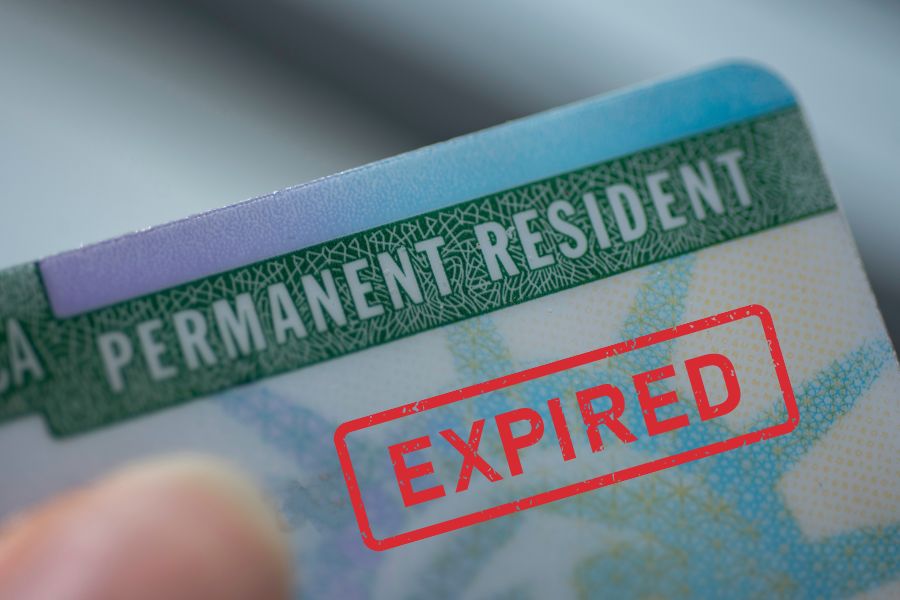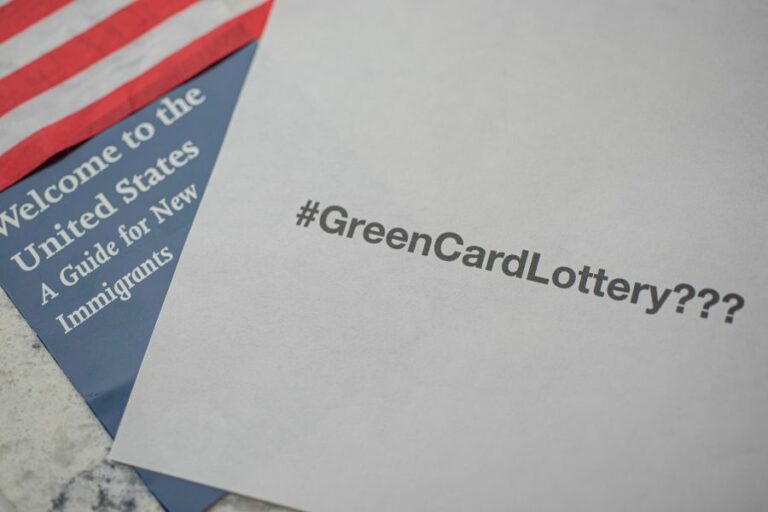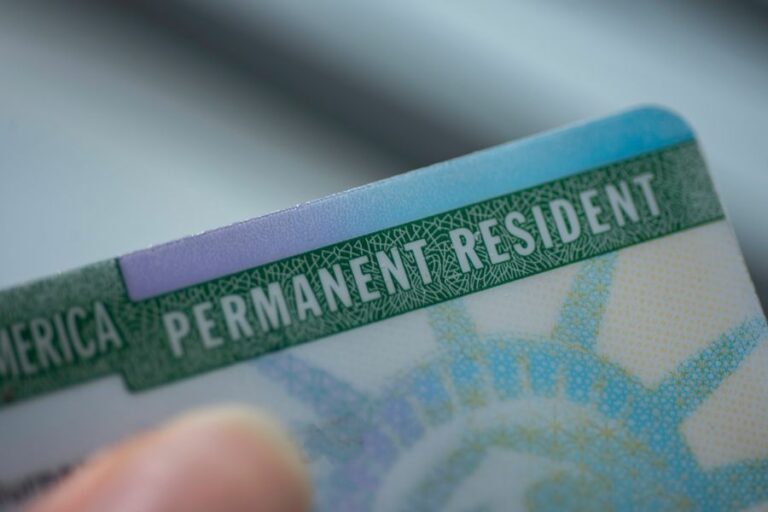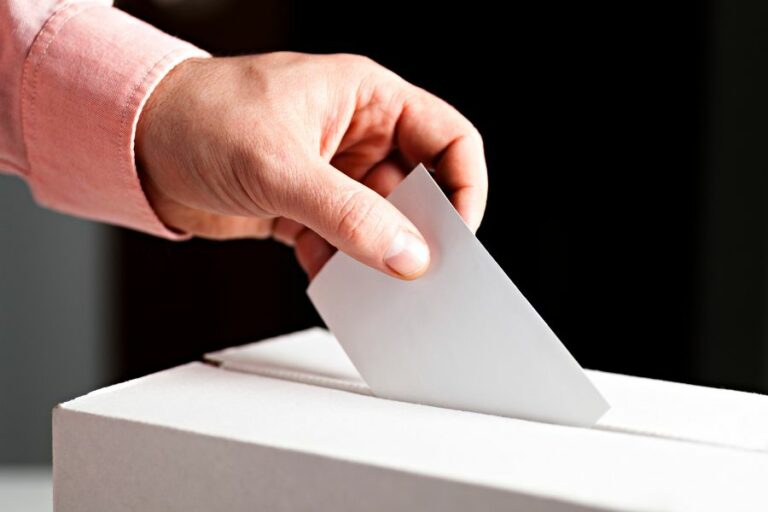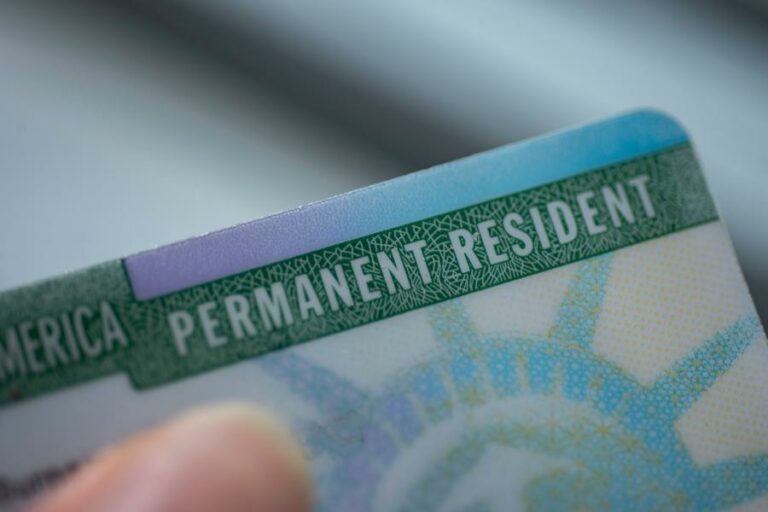Green Card Expiring or Expired: What To Do?
A green card, officially known as a United States Permanent Resident Card, is a document issued by U.S. Citizenship and Immigration Services (USCIS) that confirms an individual’s lawful permanent resident status in the U.S. While the status it represents is “permanent,” the physical card has an expiration date, typically ten years from the date of issue. Understanding the importance of maintaining a valid green card is crucial for permanent residents, as it affects their ability to work, travel, and access various services in the U.S.
This article will provide essential information on how to manage either expiring or expired green cards.
Green Cards Expiring
Here’s what you need to know and do if your green card is expiring.
Understanding the Expiration Timeline
Permanent resident cards come with an expiration date prominently displayed on the front. It’s important to note that the average processing time can vary from 5 to 12 months, depending on various factors including the USCIS office handling the application. Therefore, planning ahead is crucial to avoid any lapse in having a valid card, that’s why is recommended to start the renewal process at least six months before the expiration date.
Preparing for Renewal
Gather necessary documents such as your current green card, passport-style photos, and any other required supporting documents. The renewal process involves biometrics (fingerprinting and photo), so you’ll be scheduled for an appointment at a local USCIS office.
The Renewal Process
To renew a green card that is about to expire, file Form I-90, Application to Replace Permanent Resident Card. This form can be submitted online or by mail. The current fee for renewal, is $540, which includes a $455 application fee and an $85 biometrics fee.
Exceptions to the Expiration Rule
When it comes to the expiration and renewal of Green Cards, there are specific exceptions that apply to certain categories of individuals, which can significantly alter the standard renewal process:
- Elderly Permanent Residents: applies to individuals who were issued the older version of the green card that does not have an expiration date. However, it’s advisable for them to seek a new card for practical reasons, such as ease of travel and proof of legal status.
- Conditional Permanent Residents: Individuals who hold a conditional green card, typically valid for two years, have different renewal requirements and must convert their status to a regular permanent resident.
- Special Status Holders: Certain green card holders, such as refugee or asylee status, may have different procedures and timelines for renewal.
- Disabled or Special Medical Condition Holders: In some cases, individuals with disabilities or special medical conditions may have different procedures or assistance available for the renewal process.
- Military Members and Their Families: Members of the U.S. Armed Forces and their immediate family members may be subject to different rules regarding green card renewal and expiration
You may check the complete information at USCSIS website.
Renewing Older Green Cards
Permanent residents who possess older green cards that do not have expiration dates (issued before the introduction of expiration dates in 1989) fall under a special category. While these cards are technically valid for life, its holders should be aware that USCIS requires these cards to be renewed to the current version. This ensures compliance with modern security standards and eases identification processes, international travels, etc.
Green Card Expired
Here’s what you need to know and do if your green card has expired while in the USA.
Understanding Your Status
Even if your green card expires, your status as a lawful permanent resident does not automatically change. However, an expired green card can create significant hurdles in proving your legal status for employment, travel, and more.
Immediate Steps for an Expired Green Card
File Form I-90 as soon as possible if your green card has already expired. While waiting for the new card, if you need evidence of your status, USCIS can provide a temporary proof of status during the renewal process.
Temporary proof of status
After submitting Form I-90 for green card renewal, USCIS issues a receipt notice (Form I-797), which serves as a temporary proof of lawful permanent resident status. This notice not only acknowledges the application but often extends the validity of the green card, typically by 12 months. With this notice, along with the expired green card, one can travel and re-enter the U.S., and it also meets employment verification requirements.
Travel During Renewal
Green card holders should be aware that traveling abroad while their renewal application is pending can be risky. If traveling is necessary during this time, it’s recommended to carry the expired green card along with the receipt notice of Form I-90. This notice often extends the card’s validity, allowing re-entry into the U.S.
Emergency Situations Proof
In situations where immediate proof of status is needed, such as urgent travel, one can obtain an Alien Documentation, Identification & Telecommunications (ADIT) stamp in their passport by scheduling an appointment with a local USCIS office. This stamp is valid for a year as well and serves as a temporary green card for various purposes, including travel and employment.
Employment and Identification
Employers are legally required to verify the work authorization of their employees. An expired green card can affect your employment, as it is a key document for the Form I-9, Employment Eligibility Verification.
Impact on Social Services and Government Benefits
An expired green card can potentially affect access to social services and government benefits. While your status as a lawful permanent resident remains, lack of valid proof might complicate transactions with agencies that require up-to-date identification.
Maintaining Proof of Legal Status During Green Card Renewal
During the period of green card renewal, there are effective measures that individuals can adopt to affirm their legal status. These measures not only assist in maintaining employment but also ensure that individuals can demonstrate their lawful status in the U.S.:
- Leveraging the Form I-90 Receipt Notice
- Obtaining an ADIT Extension Stamp
- Securing a Temporary I-551 Stamp
Conditional Green Cards
For those with conditional green cards, typically valid for two years, timely action is crucial. Filing Form I-751, Petition to Remove Conditions on Residence, is mandatory within the 90 days before the card’s expiration. Failure to do so can lead to loss of resident status and potential removal proceedings.
Renewing Expired Green Cards from Abroad
You find yourself abroad, maybe visiting relatives or on a business trip, when it dawns on you that your green card is about to expire, has already expired, or is missing. Recognizing that a valid and current green card is essential for re-entering the U.S., you’re faced with the question of what to do next.
It’s crucial to know that renewing or replacing a green card isn’t possible from outside the U.S.; you need to be within the country to undertake this process. However, there are a few option you can use to return to the United States after your temporary stay overseas.
- Immediate Actions: If you realize that your Green Card has expired while you are abroad, the first step is to contact the nearest U.S. consulate, embassy, or USCIS field office. They provide guidance specific to your situation and the procedures to follow.
- Form I-90 Limitations: Typically, Form I-90 (Application to Replace Permanent Resident Card) is not processable if you are outside the U.S. This form is usually filed when you are in the U.S. Therefore, it’s crucial to seek alternative solutions through U.S. consular services.
- Boarding Foil (Travel Document): You may need to apply for a “Boarding Foil” (formerly known as a “Transportation Letter”), which allows you to return to the U.S. despite having an expired Green Card. To obtain this, you’ll likely need to provide proof of your identity, your expired Green Card, and evidence of your permanent residency (like tax returns or employment records). The process can take several weeks.
- Required Documents: Be prepared to present various documents when applying for a Boarding Foil, including a valid passport, your expired Green Card, evidence of your prolonged stay outside the U.S. (if applicable), and reasons for not renewing your Green Card on time.
- Re-Entry and Renewal: Once you return to the U.S., you should immediately start the Green Card renewal process by filing Form I-90. It’s important to not delay this step, as failing to renew your Green Card can have long-term impacts on your legal status.
- Possible Challenges: Be aware that re-entering the U.S. with an expired Green Card and a Boarding Foil might lead to questioning at the port of entry. You should be prepared to explain your situation and provide evidence supporting your continuous permanent resident status.
- Impact on Naturalization Eligibility: If you plan to apply for U.S. citizenship, be aware that prolonged periods outside the U.S. and an expired Green Card can impact your eligibility for naturalization. It’s crucial to understand these implications and plan accordingly.
Additional information
Legal Implications: While there are no specific penalties for an expired green card, failing to maintain valid identification can have indirect legal consequences, such as difficulty in renewing driver’s licenses or other state-issued ID.
Keeping Records Updated: Always inform USCIS of any changes in your personal information, such as a change of address, to ensure smooth processing and receipt of notifications regarding your green card renewal.
Citizenship as an Option: Permanent residents eligible for naturalization may consider applying for U.S. citizenship through Form N-400. This eliminates the need for green card renewals and offers additional benefits like voting rights.
Lost or Stolen Green Cards: Losing a Green Card or having it stolen can be distressing, in such scenarios, it’s important to follow a specific set of actions to mitigate any potential problems, especially if you are planning to re-enter the U.S. or need to prove your legal residency status:
- File a Police Report: As soon as you realize that your Green Card is missing, file a police report. Keep a copy of the report, as you may need it for future reference.
- Report the Loss to USCIS: Immediately inform U.S. Citizenship and Immigration Services (USCIS) about the lost or stolen Green Card. This can be done by submitting Form I-90, Application to Replace Permanent Resident Card.
- Provide Necessary Documentation: When filing Form I-90, include any relevant documentation, such as a copy of the police report and evidence of your identity. If your Green Card was also expired, you should provide any documentation that supports your continuous residence in the U.S. and your eligibility for a Green Card renewal.
- Apply for a Travel Document if Abroad: If you are outside the U.S. when your Green Card is lost or stolen, and it’s also expired, you should contact the nearest U.S. consulate or embassy. You may need to apply for a “Carrier Documentation” or a “Boarding Foil,” which will allow you to return to the United States. Be prepared to provide evidence of your identity, your status as a permanent resident, and a police report if applicable.
- Future Precautions: Once you receive your replacement Green Card, take measures to safeguard it against loss or theft in the future. Consider keeping it in a secure place and carrying a photocopy or digital copy for everyday purposes.
References:
- https://www.usa.gov/renew-green-card
- https://www.boundless.com/immigration-resources/uscis-green-card-renewal-process/#:~:text=An%20expired%20green%20card%20just,United%20States%20after%20traveling%20abroad
- https://www.immigrationhelp.org/learning-center/how-to-renew-your-green-card
- https://www.uscis.gov/i-90https://www.uscis.gov/green-card/after-we-grant-your-green-card/replace-your-green-card

